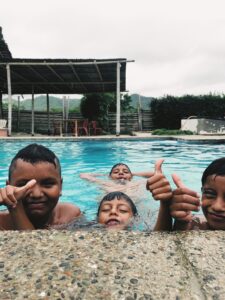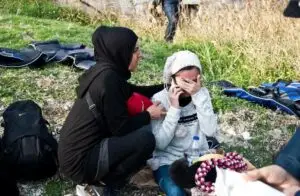Everything written in these pages is based on personal experience. Overall, this is the way I remember what happened. And everything, of course, is based on actual events. Unfortunately.
“In remembrance of the holocaust
This picture is of Czeslawa Kwoka, 14 years old, a child. She was executed in Auschwitz on February 18, 1943, injected with phenol right into her heart. Just before the execution, she was photographed by a fellow prisoner, Whilem Brasse (he later testified against Kwoka’s executioner).
Czeslalawa, terrified and beaten, did not speak the language of the executioner and had lost her mother only a few days before. She was one of around 250,000 children executed in Auschwitz-Birkenau. Her face is the result of people’s political and moral decay. There are still individuals who want to destroy what is human around us and in us. Look around. They also sing in our time.
…As today’s story (I experienced during my service) shows.
The Market 0945 GMT
At first glance the object looked like any ordinary pouch. It was only when the man in the dirty uniform held it up to my face that I began to see what it was.
He sneered and revealed his lack of dental care.
“See – nice, huh?”
To play up his own importance, he beat himself on his dark brown, uniformed chest and pointed at the insignia.
“The Beirut brigade – I was there.”
He looked around. Probably to gain some recognition from his three militia buddies standing right behind him. Since there were several civilians at the check post, I figured he also did it to win some respect from them, too
It was blasting hot. It wasn’t ten in the morning yet, but at that time of year the sun fried our backs as fast as it rose above the
horizon. Behind us the market extended out over the plain. It was already crowded with animals and people. The slaughter had already started and the warm smell of blood and animal excrement began to waft toward us like waves onto a beach.
I sighed. We were a long way from sandy beaches and refreshing breezes.
Brother in arms
To the right of me stood Hanssen, a colleague and brother-in- arms.
I happened to be in charge of the check post. There were seven of us, all MP corporals, and we never had to appoint anyone to be in charge or intervene in hot situations. We all took turns.
Hanssen was ready to back me up – no matter what happened. On the other side of him stood our Land Rover. Painted white with the UN symbol in black, in contrast to the white. I heard the radio crackle. An APC (armoured personnel carrier) was positioned on my left.
It stood there white and imposing. The lieutenant, who was the leader for the security group on site, sat sprawled on the top hatch and watched carefully along with us.
The Beirut brigade
Together we created a kind of gate that everybody had to pass through if they were going to the market. We were the weakest part of the gate. I brushed aside the realization that we were very vulnerable and tried not to think of what would happen if an exchange of fire ensued. We saw every day what could happen.
The three soldiers in front of me were armed with American M16 rifles. The barrels were still pointed down toward the ground.
“Taskara,” I repeated the Arabic word for ID card and wiped away the sweat that had begun to trickle out from underneath my blue cap.
“Minh fadlak – please,” I added.
“No taskara – don’t need it.”
The militia man beat himself again on the chest with a dirty, brown fist where the Beirut brigade insignia shined in green.
“Haddad – we belong to Haddad. This is our area. We decide here.”
That wasn’t quite the case, of course, and I could see that he knew this, too. His eyes shifted nervously back and forth. It seemed that they were as unsure of us as we were of them.
The Ph.D in murder
This was just the usual bullshit they served up to see how far they could push us. He was also afraid of losing face in front of the civilians at the check post. Losing face was dangerous for these guys. They based their entire existence on spreading terror and fear among the civilian population in the area.
The militiamen had entered the UN area by passing the Blue Line 400 meters up the road and walking down to the market. Nobody should have been able to enter that way, but it happened now and then.
The difference this time was that they came armed. That meant it was a hot situation, and Hanssen and I had to skip coffee and breakfast and respond in the heat with our blue light and sirens.
“No taskara – no market.”
I spoke steadily and decisively to the scumbag. The only way to communicate with him was with broken Jalla-English. Most of the people in this area studied French in school, if they were lucky enough to have gone to school. The militia man in front of me probably didn’t have any education at all. If you don’t consider murder, threats and rape to be education. If you do, then he probably had a Ph.D.
“No weapons – no uniforms,” I continued.
As if I were talking to a child. Which I actually was. The difference was that this child was armed with a M16. For him, to kill a human being would be just as easy as it would be for a child, in his innocence, to crush an insect.
To emphasize my point I raised my hand and gave a pre-arranged signal to the lieutenant in the APC. The lieutenant drew back the bolt on the 12.7 mm machine gun with a loud click.
Hanssen walked slowly away from me and to the right toward the Land Rover. This was also planned. He had to be near the radio and at the same time not too close to me in case shots were fired.
The militiaman’s three friends stepped back. Probably for the same reason. The Beirut hero understood that this was as far as he could go. At that point he could retreat from the situation without losing face.
Confronted with a 12.7 and three of the lieutenant’s soldiers running toward us at full speed – called in with the lieutenant’s throat mic – he had only one choice. There was no doubt that he was in our area, and we had authority here. He knew that.
The tobacco pouch
He stuck the tobacco pouch in my face again.
“Shabra and Shatila,” he said.
Again he beat on the Beirut insignia. I understood that he was trying to tell me that he was one of those who had been part of the Shabra and Shatila massacres. As if I didn’t know that. Produced by Israel, directed by Ariel Sharon and carried out by the Haddad militia.
The entire world had managed to overlook it in silence.
I looked closer at the tobacco pouch.
The knot that made up the lower part of the pouch was dark brown and looked like a dirty prune. It was hard to see where the knot stopped and the skin above it started. The knot, skin and laces on the top created a small pouch. A little like the leather pouches we put marbles in as kids.
In contrast to usual leather pouches, though, this one was made out of a woman’s breast. Cut off with a sharp knife at the breast bone and afterward made into a useful tobacco pouch for a proud Haddad soldier.
Welcome to Lebanon.

What is a lifetime, really?
Twenty good years? A good friend of mine once said while walking in the mountains of Gran Canaria.“Knut, we have twenty good years left. Use

How to protect yourself from your PTSD, when the world is on fire
(It is war. And it is mine. ) The headlines that meet me today are about the war in Ukraine. Alarms going off, people fleeing,

The thin film of civilization
The thin film of civilization This picture are taken on Lesvos. Her husband and baby drowned on the way over from Turkey. This is a
